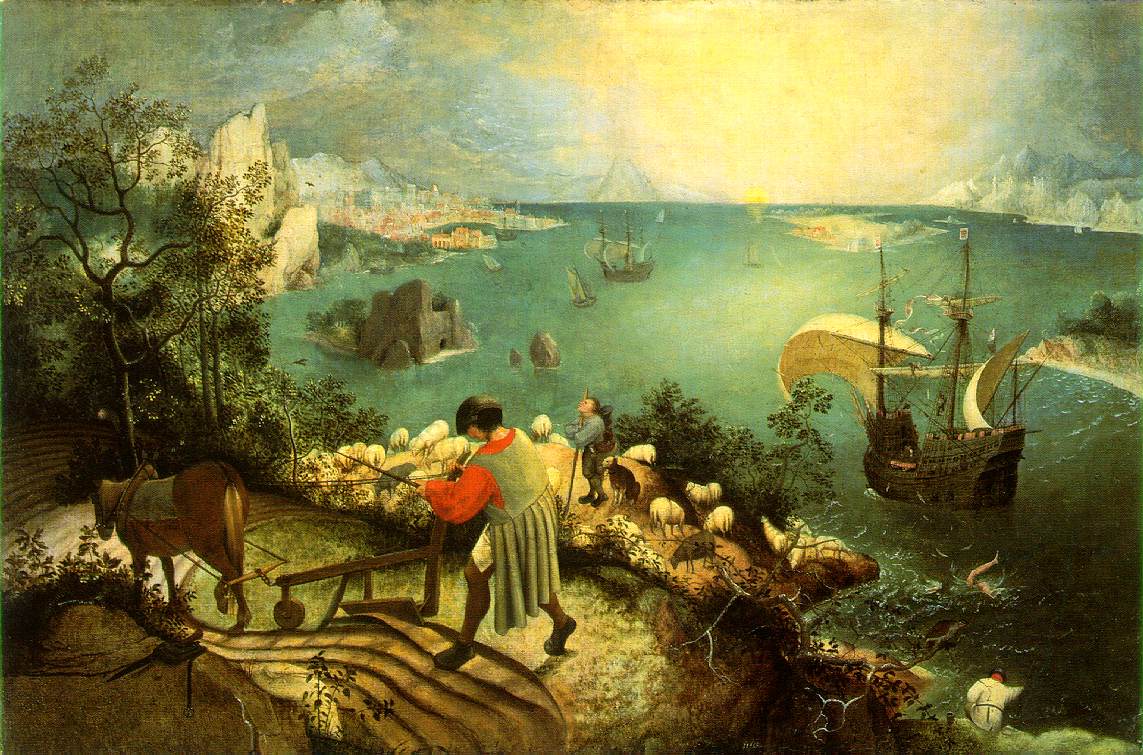
Pieter Brueghel, Landscape with the Fall of Icarus (c. 1558)
About suffering they were never wrong,
The Old Masters: how well they understood
Its human position; how it takes place
While someone else is eating or opening a window or just walking dully along;
How, when the aged are reverently, passionately waiting
For the miraculous birth, there must always be
Children who did not specially want it to happen, skating
On a pond at the edge of the wood:
They never forgot
That even the dreadful martyrdom must run its course
anyhow in a corner, some untidy spot
Where dogs go on with their doggy life and the torturer's horse
Scratches its innocent behind on a tree.
In Brueghel's Icarus,for instance: how everything turns away
Quite leisurely from the disaster; the ploughman may
have heard the splash, the foresaken cry,
But for him it was not an important failure; the sun shone
As it had to on the white legs disappearing into the green
Water; and the expensive delicate ship that must have seen
Something amazing, a boy falling out of the sky,
Had somewhere to get to and sailed calmly on.
Landscape with the Fall of Icarus [1962]
William Carlos Williams (1883-1963)
According to Brueghel
when Icarus fell
it was spring
a farmer was ploughing
his field
the whole pageantry
of the year was
awake tingling
near
the edge of the sea
concerned
with itself
sweating in the sun
that melted
the wings' wax
unsignificantly
off the coast
there was
a splash quite unnoticed
this was
Icarus drowning
Icarus [1989] - Edward Field (1924- )
Showed that anything more spectacular had occurred
Than the usual drowning. The police preferred to ignore
The confusing aspects of the case,
And the witnesses ran off to a gang war.
So the report filed and forgotten in the archives read simply
"Drowned," but it was wrong: Icarus
Had swum away, coming at last to the city
Where he rented a house and tended the garden.
"That nice Mr. Hicks" the neighbors called him,
Never dreaming that the gray, respectable suit
Concealed arms that had controlled huge wings
Nor that those sad, defeated eyes had once
Compelled the sun. And had he told them
They would have answered with a shocked, uncomprehending stare.
No, he could not disturb their neat front yards;
Yet all his books insisted that this was a horrible mistake: What was he doing aging in a suburb?
Can the genius of the hero fall
To the middling stature of the merely talented?
And nightly Icarus probes his wound
And daily in his workshop, curtains carefully drawn,
Constructs small wings and tries to fly
To the lighting fixture on the ceiling:
Fails every time and hates himself for trying.
And now dreamt of his fall, the tragic fall of the hero;
But now rides commuter trains,
Serves on various committees,
And wishes he had drowned.
Hans Bol , Landscape with the Fall of Icarus (c. 1565)
Consider Icarus, pasting those sticky wings on,
testing this strange little tug at his shoulder blade,
and think of that first flawless moment over the lawn
of the labyrinth. Think of the difference it made!
There below are the trees, as awkward as camels;
and here are the shocked starlings pumping past
and think of innocent Icarus who is doing quite well:
larger than a sail, over the fog and the blast
of the plushy ocean, he goes. Admire his wings!
Feel the fire at his neck and see how casually
he glances up and is caught, wondrously tunneling
into that hot eye. Who cares that he fell back to the sea?
See him acclaiming the sun and come plunging down
while his sensible daddy goes straight into town.